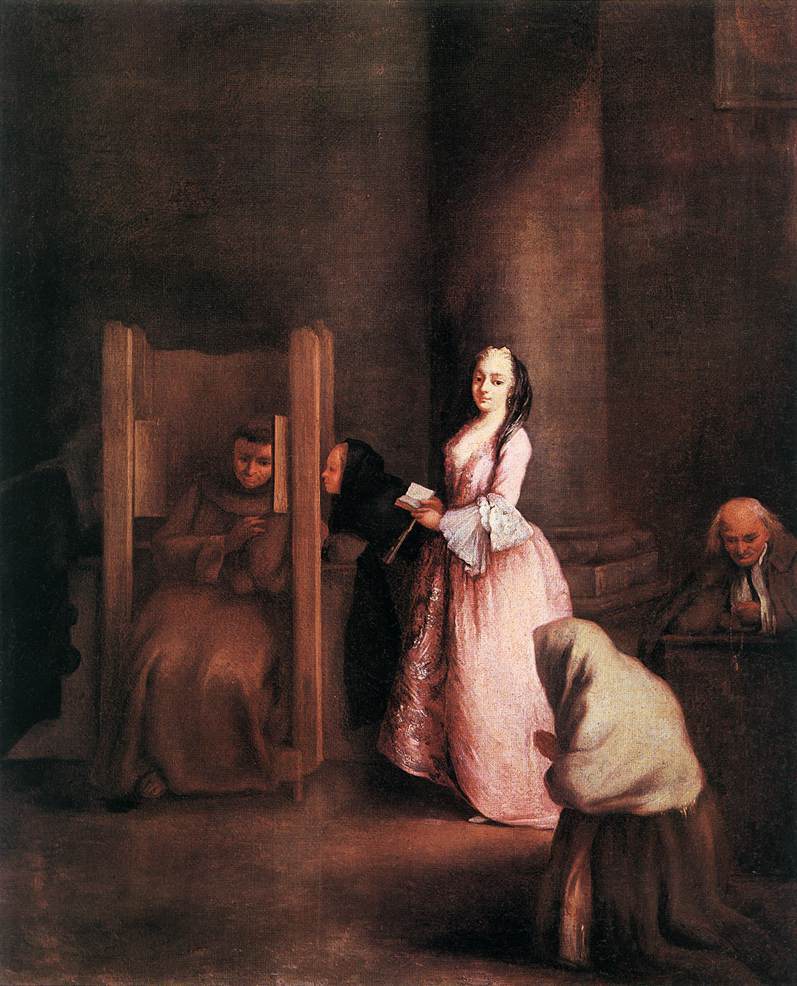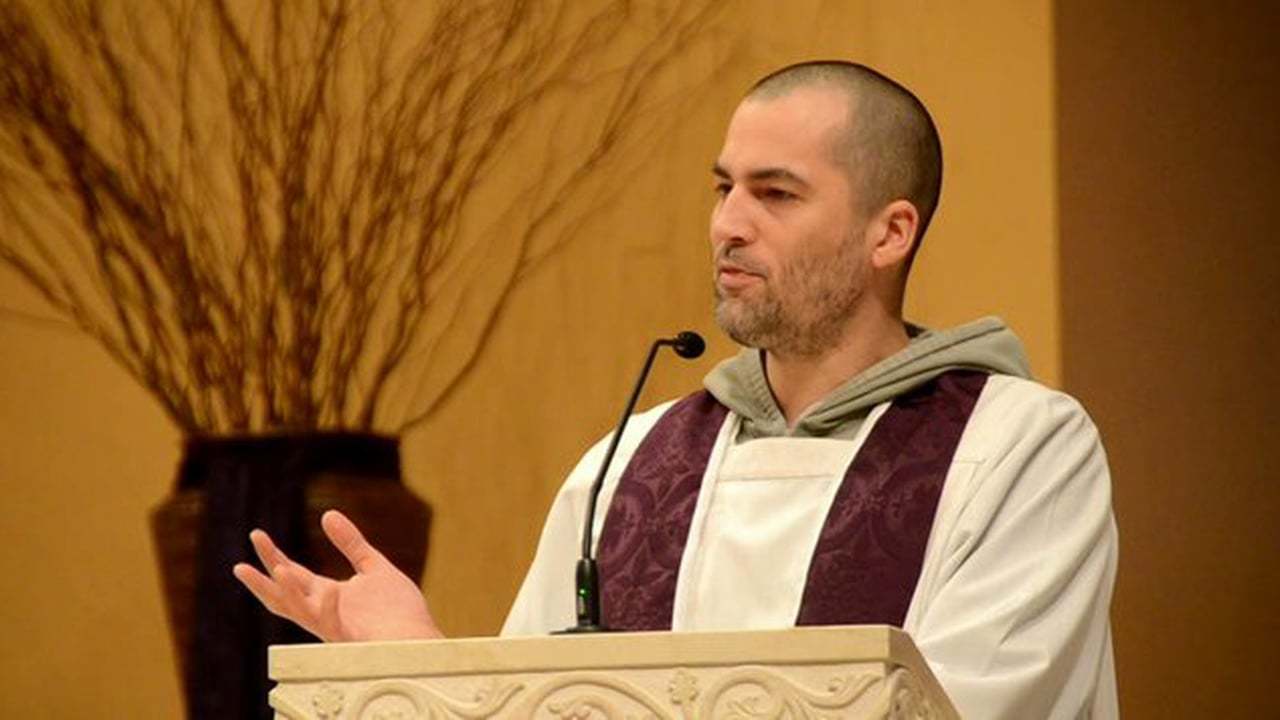 I’d like to start off with two questions. Can I see a show of hands, please: how many people like going to Confession? Second question: how many people like coming out of Confession? Think about the difference. We all know what it’s like to go to Confession: there’s a sense of nervousness, guilt, a fear of being embarrassed or condemned. But we also know what it’s like to come out of Confession: the sense of peace, relief, and joy. There is a unique kind of joy here: in being completely free of sin, healing our relationship with God, or receiving a kind word or a challenging call to be better. Focus on that joy, because God is saying something to us through it!
I’d like to start off with two questions. Can I see a show of hands, please: how many people like going to Confession? Second question: how many people like coming out of Confession? Think about the difference. We all know what it’s like to go to Confession: there’s a sense of nervousness, guilt, a fear of being embarrassed or condemned. But we also know what it’s like to come out of Confession: the sense of peace, relief, and joy. There is a unique kind of joy here: in being completely free of sin, healing our relationship with God, or receiving a kind word or a challenging call to be better. Focus on that joy, because God is saying something to us through it!
You see, everyone wants direction. I want direction about what to do this week, how to be a good priest, and how to love and serve you better. Everyone wants to know what they’re supposed to do in life. We want to know whom to marry and when, where to live, or “Should I go to school next year or work?”
The first reading gives us an amazingly beautiful truth to know better where God is leading us: “God will lead Israel with joy” (Bar 5:9). God has designed us for joy and so, when we find joy, we should generally follow that. The entrance antiphon reads similarly, “The Lord will make the glory of this voice heard in the joy of your heart.” God uses joy to lead us.
But we have to be able to see the difference between joy and pleasure, or deep joy and superficial joy. We’ve all done things that seemed really fun at the moment, and then left us with regret. Getting drunk can seem like a lot of fun because we’re at a wild party and everyone’s relaxed, but afterwards leaves us empty. Pornography is extremely tempting but never gives us what it promises; every time we do it we feel more and more unsatisfied. Other times, we look forward to using the computer and checking out social media, in order to relax, but then we find ourselves more tired than when we began. Why is that? Because it didn’t give us the joy we’re looking for. The same thing happens when we’re sad: we eat, not because we’re hungry, but because we feel down; it’s called ‘comfort eating.’ But it doesn’t help, does it?
Pay attention to the result, or ‘fruit,’ of doing something: God never leads us to happiness through superficial pleasure. Now pleasure is good: sometimes it’s good to watch a comedy just to relax, to celebrate with good food, check out social media. We just have to be careful with superficial pleasure, which starts out good, but then leads to emptiness.
But then there’s the opposite: some things begin with difficulty, but then give great satisfaction afterwards. Confession’s a good example: it brings us profound joy, it’s just hard to get there. Very few people like exercising every day. But when we choose to go for a walk or run, go to the gym, play sports, we feel great afterwards. God is speaking to us through that! He’s telling us that we should take better care of our bodies. Or when we put down our phones, unplug from world and spend some good time with family and friends, have some great conversations, we feel joy. God’s using this to tell us something.
The classic story about figuring out how God leads us through joy comes from St. Ignatius of Loyola, of modern-day Spain, who was a soldier and a worldly man. In 1521, when 30 years old, his knee was shattered in battle and he had to recover in a hospital for some time. To pass the time, he asked for the kind of books he liked: books about chivalry. Because they had none, they gave him a life of Christ and books about the saints. When he read these, “he began to be attracted to what he found narrated there… While reading the life of Christ our Lord or the lives of the saints, he would reflect and reason with himself: ‘What if I should do what Saint Francis or Saint Dominic did?’ In this way he let his mind dwell on many thoughts; they lasted a while until other things took their place. Then those vain and worldly images would come into his mind and remain a long time. This sequence of thoughts persisted with him for a long time. But there was a difference. When Ignatius reflected on worldly thoughts, he felt intense pleasure; but when he gave them up out of weariness, he felt dry and depressed. Yet when he thought of living the rigorous sort of life he knew the saints had lived, he not only experienced pleasure when he actually thought about it, but even after he dismissed these thoughts, he still experienced great joy… Then he understood his experience: thoughts of one kind left him sad, the others full of joy” (Office of Readings for July 31). And this is how he knew God was calling him to something deeper. He started following this joy and it gave him more joy, and this kept on happening, leading him to become a priest.
This Tuesday, Dec. 8, Pope Francis has called for a “Year of Mercy,” a year to celebrate how merciful our Father is, a year to ask His mercy and give His mercy to other people.
The first way we’re going to celebrate our Father’s mercy is by our parish mission with Fr. Anthony Baetzold from New York, who will be here next week. We’ll offer Confessions, Dec. 14-17, and then we’ll have our regular Advent penitential service on Sunday, Dec. 20.

Fr. Anthony Baetzold, CFR
And to make it easier for everyone to receive our Father’s mercy and then pass it on, I’d like to announce that we’re going to have Confession available every 1st Saturday of the month from 9:30 a.m. to 9:30 p.m., except during the 5 p.m. Mass. Basically, all day long, I or another priest will be waiting in the confessional. Now there will be no excuse not to come! I thought about putting it on other days, but then I realized: when we think, for example, “It’s now February, I can go to Confession any time this Saturday. I just have to get there.” And I’ll remind everyone about it the Sunday before.
This will be a sacrifice for me, but one I’m happy to make; for those who are concerned about me, I’ll try take care of myself. But I believe that if we can all get in the habit of going to Confession every month, we can experience deep joy every month. We won’t have to say anymore, “It’s been 6 months since my last Confession,” but, “It’s been 1 month…” We won’t have to wait until, say, we’ve committed a big mortal sin to come. We can come to work on those little sins that hurt relationships. And have you ever noticed that, after Confession, we’re kinder to other people? We’ve just been forgiven so we’re more forgiving to other people. Well, now we can grow in kindness every single month! The sacrament of reconciliation is an essential part of who we are as Christians, and, as part of our parish vision of forming disciples for Christ, this will be a huge part of growing in discipleship.
This is one reason why we’re renovating the Confessionals. God’s mercy, of which the Sacrament of Reconciliation is a key part, is so important that Pope Francis wants us to have a whole year celebrating it! It’s so important that we need an exterior sign to remind us of its importance.
First Saturday Confessions will start in February, because I presume everyone will go during the parish mission or on Dec. 20 and no one will sin during the Christmas break. But once we go back to work, there will be plenty of sins! Starting in February will also be a good preparation for Lent. Please let me know what you think about this: questions, concerns, and feedback. We might ask ourselves, “How could we promote it?” Perhaps families could go together.
The joy of going to Confession is profound, and it’s a joy God wants us to experience in so many other ways. Pay attention to those deepest joys, because that’s how God’s leading us.